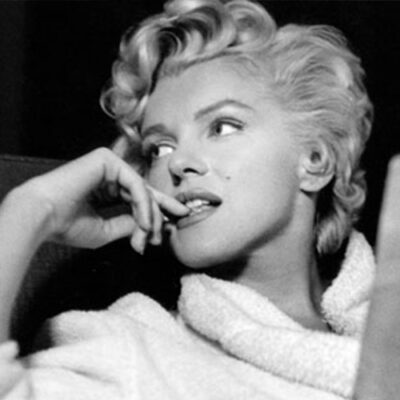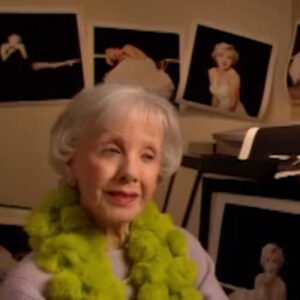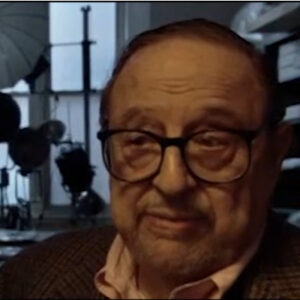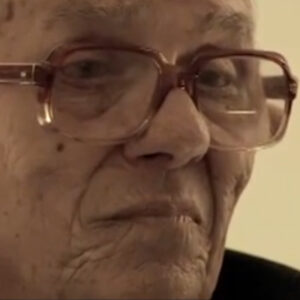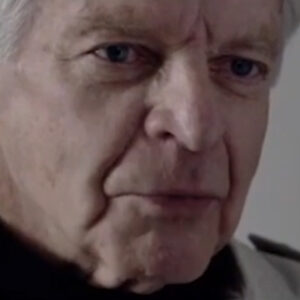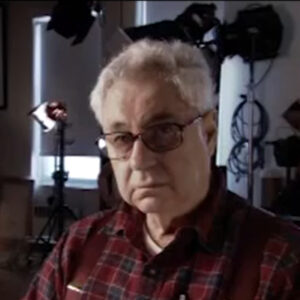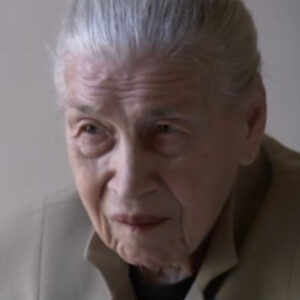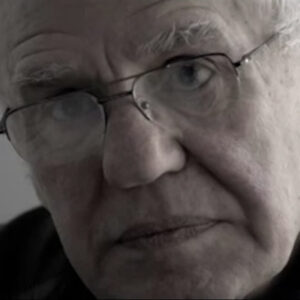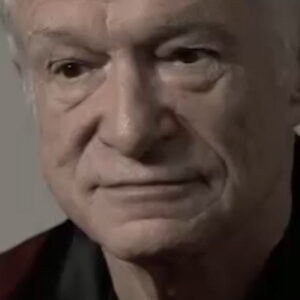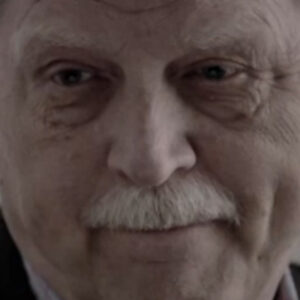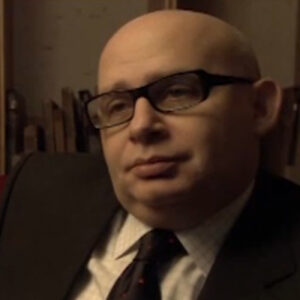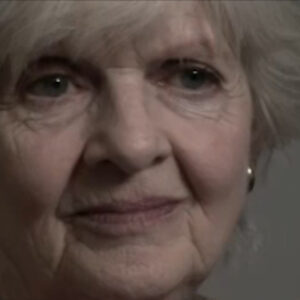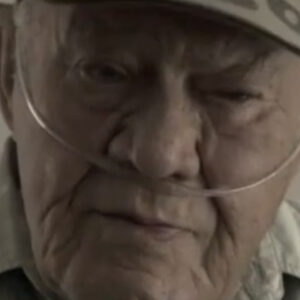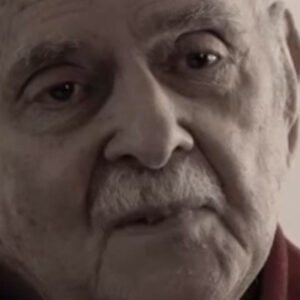Norman Mailer: So we think of Marilyn. It was every man’s love affair with America. Marilyn Monroe, who was blonde and beautiful and had a sweet little rinky dink of a voice. You know, the cleanliness of all the clean American backyards. She was our angel. The sweet angel of sex. And the sugar rough sex came up from her. Like a resonance of sound in the clearest grain of a violin. Across five continents. The men who knew the most about love. We’d covered her. And the classical pimples of the adolescent working its first gas pump would also pump for her since Marilyn was a deliverance, a very Stradivarius of sex. So gorgeous, forgiving, humorous, compliant and tender that even the most mediocre musician would relax his lack of art in the dissolving magic of her violin. I’m gonna… I’ll keep reading.
Interviewer: Great.
Norman Mailer: When the sexual imminence of her face. Came up on the screen like a sweet peach bursting before one’s eyes. She looked then like a new love. Ready and waiting between the sheets in the unexpected breath of a rare sexy morning. Look like you’d step fully clothed out of a chocolate box for Valentine’s Day. So desirable is to fulfill each of the letters in that favorite word of the publicity, flack curvaceous, so curvaceous, yet so without menace as to turn one’s fingertips into ten happy prowlers.
Interviewer: Once the paper, the paper papers coming into the shop, you can just keep the paper down.
Norman Mailer: Is it bothering. Is it ruining the shot.
Interviewer: No, that one was fine. Now, this this would be the one that I think could start the film. So, you know.
Norman Mailer: A movie star of the most stubborn secretiveness. And flamboyant Tander, most conflicting arrogance. An onrushing inferiority. Great populist philosophers. She loved the working men. And most radical of mates. A queen of a castrator. I was ready to weep for a dying Mineau. A lover of books. He did not read and a proud and violent artist who could haunch overdrew publicity when the heat was on her faster than a whore could. Lust over a hot buck. A female spirit of wit. Insensitive energy. Who could hang like a slut for days in a muddy, mooted coma? A child girl? Yet an actress, a loser, right, by dropping her glove at a premiere, a fountain of charm. And a dreary bore. A giant. And an emotional pygmy. A sexual oven whose fire may rarely have been lit. She has much to learn about posing for a camera, but she does not have to learn. How to pose? She has learned already what one hundred little moves of her figure will do for workers serviceman. Sailors. Truck drivers. Marines. She knows how to offer the restrained gift of a smile. She is lady eager of the working class and our own Rubins on a four by five speed graphic camera. For the photographer. Sorry. Click for it. The photographer is usually seen as the artist and his model as a species of still life. She becomes the artist when she takes a pose. She paints the picture into the camera and few photographers will fail to pay. Her image is just low enough now.
Interviewer: Yes, its perfect.
Norman Mailer: I like the quote you chose. I got to tell you. Thank you. Thank you for writing this. Very easy for me. You got me to the point where I was thinking myself right now.
Interviewer: Can you get.
Norman Mailer: She is young. She’s lovely. She is clean. She’s likable. She’s dreamy and energetic by turns. She’s capable of getting into love affairs. And getting out of them, yet she’s still painfully shy. Remote from herself. So she could be tender. Yet cold blooded. Her love tends to end. When the role ends. So she has more and more single minded about a career. Is it not only sanity, but life? Life depends on this. A career. Here they are. I’m changing a word or two, they’re looking at me.
Interviewer: Please.
Norman Mailer: Flesh impact is rare. Billy Wilder would later say, quote. Flesh, which photographs like flesh. You feel you can reach out and touch it. Close quote you.
Interviewer: This is one of my favorites, by the way.
Norman Mailer: Yeah. Yeah, I hope I am confident.
Interviewer: You do.
Norman Mailer: It doesn’t matter if I call you. I’m gonna call up to my heart’s content. I make calls three times before this paragraph. No, it’s no use running through the voice. Despite her wit, she was not overbearingly bright and intellectual ability is comparable to weightlifting. She lifted no weight. She had intelligence. An artist’s intelligence. And her taste. By the end of her career was close to superb. She must have had a profound sense of what was Holleman people. And what was false? For her own characterizations were sound. She knew how to enter a scene with the full aura of the character she played. And so she was able to suggest everything that had occurred on just the other side of the scene. The breeze she had smelled, the door on which she stubbed her toe. The errant whimsy of a forbidden thought to be concealed. And five distractions appropriate to the character trailing behind her like streamers. She must have seen life for some sort of divine soup of situations where every aroma spoke of the primacy. The mood. What is most interesting in the comfort? Of studying this actress. Let me start again on this one. What what what is most interesting in the comfort of studying this actress? It was to go so far is the odd air of confidence. She admits. A narcissism about her own potentialities is so great it becomes a perfume species of sex appeal, as if a magnificent girl has just walked into a crowded room and declared, I’m far and away the most beautiful thing here. Indeed, she is gorgeous in her own way with a sort of I smell good, look, I am wonderful. Look, she’s like a baby. Everyone loves.
Interviewer: Another.
Norman Mailer: Right. I’ll be with you in a sec. It is always the dislocation of her identity to which we are obliged to return was an obsession. Identity. We search for it because the private sensation when we are in our own identity is that we feel sincere as we speak. We think a real. And this little phenomenon of good feeling. Conceals an existential mystery. It is nothing less than that, the emotional condition of feeling real is, for whatever reason, far superior to the feeling of a void in oneself. Oh, no. That is nothing less than that. The emotional condition. Feeling real is for whatever reason. So far superior to the feeling of a void in oneself that it can become for protagonists like Marilyn. A motivation more powerful than the instinct of sex or the hunger for position or money. Some will give up love or security before they dare to lose the comfort of identity. She is more vivid on the screen than others. She has more energy, more humor. More commitment to the part and to the playing. She plays the roles, she gives off the happiness that she is acting. And that is indispensible for any entertainment. She is clear she is a phenomenon. There are mysterious properties to publicity. Quantity changes quality. Engels once wrote by way of indicating that one apple is a taste and one hundred crates of apples is the beginning of a business. We can leave it at a starland in the lower depths of an option contract who receives more publicity than any star has broken through the sound barrier. The scene is more indecent to DiMaggio than he ever conceived. The sound of New York Snickers takes his ear. New York Snicker’s is a jargon based on sewers, whores and delicatessen. Look at that pastrami unable to endure any more. DiMaggio tries to get away. A group of newspapermen cut him off on the way to put Shaw’s. Footsies around the corner from where they are shooting the aristocracy. It took Shaw’s we’ll have their unsaid reaction. One of the reporters says that instead. Joe, what do you think of Marilyn having to show more of herself than she’s shown before? A newspaper man on the street is the equivalent of a surgeon who goes into cutting because he likes to discover the route by which meat. Falls away before the knife. She is also one of the toughest blondes ever to come down the pike there in the concentrated center of her misty blonde helplessness. She is a travelling omnibus of motives. It moves most quickly of the variety of reasons. Coincides best. With the multiplicity of herself. She is in the position of tasting victory over a powerful enemy. How many of us ever reach such a vengeance? But then she like a Shakespearean hero in those middle acts when good fortunes accumulate. Her love affair with Arthur Miller has begun. In the most confident part of her personality, Tenshi, they have to see it as destined for herself. Arthur Miller. We must picture this tall and timid hero. Middle class life. As guarded in his synopses as a banker when he is visited by the return of a dream. A blonde and indescribable movie star as wild and reputation is the berry dynamos of American life, of which he has seen so far so little. And she is as delightful in her presence, as funny, as changeable, as interesting. And as remarkable as any adolescent dream of a heavenly blonde, yet this blond heaven wants him. The desire to take off clothes. May even relieve the impulse. That pushes one. Toward an open window. Marilyn has always been working toward nudity. Certainly, she has not been a model for nothing. Nor, quote, wanted desperately to stand up naked for God and everyone else to see. Close quote. Nor had her nude calendar, nor had her nude calendar. Northern news sessions, she will still go through with a few photographers. Her breasts so visible for an instant and the Misfits. Not all for nothing. Perhaps as one drifts toward a state of near the near insane, perhaps as one drifts toward a state. But the Neren saying there was some impulse to turn inside out reverse habits. Fling go off clothes and your morals along with the clothes. She is. A surrogate. She is triumphantly proud. And she is crushed. She’s a female Napoleon. She is a female Napoleon, but only by one prod. The other soul. More timid than ever. It’s a virus ridden orphanage mouse. It is as if she has spent her life installing victories in all the psychic furnishings of one personality. While assigning all her defeats to the other. So we are at the seat of complexity for if she is living with the full equivalent of two people within her. One enormously wealthy, one exceptionally poor. It is equal to saying that she will undertake many an action that benefits one of them at the cost of the other. An intern like a frustrated general, she has to retire from the action while the other men’s. It is why so much of her life consists of stops and starts and why so many of her affections are replaced by hatred. Few are the activities she can perform. Where both of her cells can participate. It is the harshest irony of her life that this collaboration works best. Every time she disrupts a movie set. Then everything in her of raw and buried force can enjoy the discomfiture of the company. That’s it. Yeah, yeah. Did they start with. So we think about women. Yeah.
Interviewer: Yeah. Yeah.
Norman Mailer: We did. Well.
Interviewer: Great.
Norman Mailer: Yeah, good. No it went nicely. Went nicely. I’m delighted my voice held up relatively well. Now, we had the pleasure talking.
Interviewer: [indistinct] Are you ready? I’d actually like to before we get into sort of real particulars, what was it what what you didn’t just write about her once you wrote about her in this Shagari and then you wrote about her in her sort of own voice. What was the. Motive. Motivation is not even a word, really. I mean, but just that the impetus to do it is clearly a good subject for you.
Norman Mailer: Well, I first of all, so far as you can be in love with someone who is not part of your life. I was in love with her along with what was a 50 million or 100 million American men. There was that quality she had. Everybody loved her, except, unfortunately, those who had to live and work with her all the time, because then they got the other side of her nature. But the positive side that she gave both to everyone was so delightful. And I just loved her. I loved her. I wanted to write about her. But, you know, when you write, you have to have in order to write a book. You have to have a deep enough motive so that it’ll keep you going. Because writing a book consists of anywhere from very roughly speaking, six months to six years of going to your desk every day and looking at the same material and pushing it a little further. And you can get to the point if you’re not happy with a book. You can feel after a while, as if your fingertips go on, your knuckles are going a funny writing with you decapitated wrists. It gets so unpleasant. So you have to love a subject. And one, you love a subject. Cause it’s a mystery that you feel you won’t be able to penetrate. To some degree. And she appeared to me that way. I thought I saw something I know about that woman without having met her ever. That is exceptional. And so I was obsessed with her. You know, writers don’t mind being obsessed because after writing a book is a species of obsession. Now, I did actually meet her many, many years down the road. And in fact, it was before I wrote Marilyn. But well, after I could have met her under ideal circumstances. The at one point when she was married to Arthur Miller, Marilyn, an author, lived about five miles away from me and my then wife, Adele, in the country. I was living in Bridgewater, Connecticut, and they were living in Roxbury. And Nora and I knew each other a bit. We’d actually lived in the same brownstone house when he was writing a Death of a Salesman. And I was writing The Naked and the Dead. We’d meet downstairs going through the mail. He’s the older writer, was avuncular and very pleasant, gave me contractual advice. We didn’t really take to each other enormously. We’d each walk upstairs and we’re thinking that other guy’s never gonna amount to much. Both of us were wrong. But the point is, when he moved to the country five miles away, I just assumed that there’d be an invitation from author to come over for dinner. And for a hope. All for a year. Some of my friends were invited. We never were and I never forgave Arthur for that. And what was my motivation? I wanted the meter so I could steal her stealing from her husband. And, you know, a criminal will never forgive you for preventing them from committing the crime that is really in their heart. And so I always had an edge against Arthur ever after.
Interviewer: Know, I want to get into the castle. What do you think was what was the glue or maybe in the end of that relationship?
Norman Mailer: Well, I think it was it’s very easy to see from Arthur, Zain. He was marrying a dream, the same dream that we all had. And then he discovered over quite a few years that there was an enormous set of expenses to this dream. She was sick a good deal of the time. She was in misery. She had an ugly temper when she was feeling terrible. Worse than that, she’d have cloudy moods, muddy moods where she wouldn’t come out of them. And then finally, the sex of which they’d started died. As that happens in many a marriage. And so from his point of view, it’s going to be easy to understand. He just he was innocent. He was essentially a very innocent man. And he got into something much more complex and ugly and difficult than he’d ever counted on. She, in turn, was a romantic and she thought ultimately looks like Abraham Lincoln, who is my boat now forever, and that he’s a great writer. And she didn’t read that much and of course, she didn’t love what was in the theater and there was Death of a Salesman. So as far as she was concerned, he was the greatest writer in America and she wanted to be seen possibly it as the greatest actress in America and a wonderful lady and all the things that she didn’t feel she was. And so he was going to be, you know, a great many people, especially ambitious people, do fall in love with that mate that can help them the most. It’s endemic. It’s one of the reasons people do fall in love. And it’s not even to be laughed at. It’s a factor. It’s a true factor. And there are love affairs that are deep without ambition and love affairs that are deep because of ambition. And that’s this was the ladder in which you began to discover over a period of time was to begin with. And this is my guess, my assumption. After the feeding frenzy, as sex was over in the early months, she began to recognize she had a measure against her lover. She had had she began to get very tired of the ways in which she was not as open as she’d expected she became. This is my guess, and I’m very critical of Arthur’s mind. I never did like this mind that much. This is just one author’s vanity against another. And so I think she got disappointed in his mind. I really believe that she thought he was so extraordinary. And then finally he was saying things that didn’t impress me that much. Which is also true in marriages. Doesn’t matter how bright you are either and the boring to your mate. And so it began to fall apart. But much greater than that was the difficulty. She was in the opiate. She was taking the drug state she was in so often the inability to be able to have any kind of reasonable existence with him. He saw the uglier side of her before it was all over. She’d scream at him, she’d Yellen and she even mocked him, I believe, at times in public. She spoke about him badly to her friends. It was getting ugly and awful. And then along came Oeming Tom. And she had one last fling, which was particularly sad because Monto and Miller liked each other. And so it was the Montanez point of view. You know, there are betrayals and betrayals. If you’re French, what’s the use of living? If you can have a betrayal, if you can’t betray a friend from time to time. But nonetheless, one must always regard proportion. And consequence as the essential elements that you use in the face of betrayal. And here he was betraying a good friend. Awful. And then he found out that Marilyn, by then she was pretty much an opiate wreck, wasn’t nearly as interesting as she was in the movies, not in bed. This is all my novels, the novels of me speaking. I don’t have insight authority. I discovered as a novelist that you’re far better off when you don’t have to deal with the facts provided provided you’re very risk, you’re terribly responsible to your own idea of yourself. You don’t just spin tales that go off in all directions. You try to apply all your knowledge from everything that’s happened to you and focus it on a couple of people. And then perhaps you end up with an image that is closer to reality than picking up this fact and that fact and this fact and that fact and verifying this fact and that fact and that one and then the verifications feel to be false. And before it’s all over, you’re in a nest of liars and vipers and and factual sores and obsessions. I’d much rather try to just say this is the way I understand it.
Interviewer: This is exactly what you did.
Norman Mailer: Yeah.
Interviewer: Something.
Norman Mailer: Let me interrupt this one. It isn’t a simple matter. Just winging it. Never. You learn as much as you possibly can. You weigh the facts. You just trust the facts or you trust them depending on your experience. You get it together as much as you can. But then there comes a point when you really have to leap across a divide and divide between the known and the unknown. And you can’t be a good writer unless you’re willing to take that leap. And you have to be immensely responsible and take that leap. You really have to be intellectually speaking, you have to be a species of Evel Knievel, which is you will jump a huge gap, but only after a lot of research about the nature of the gap. You say I’m broken down into coughing. It’s over time with my own powers of exposition.
Interviewer: Which just one more you said when you wanted in your mind to steal.
Norman Mailer: Yeah.
Interviewer: And maybe some ways you have more actually fulfilling relationship with you.
Norman Mailer: Well, let me say this. If I never succeed in stealing her and I’m looking back on it now. That was a 200 to one shot. You know, at that point, I think she would she would’ve liked me like me, but she wouldn’t be about to give up. The greatest writer in America, which was her point of view about him in order for some guy who had one successful book. At that point, I was known as a one book author. Don’t forget, all those years back then, you know, the attitude was I’d written The Naked and the dead, and that was wonderful. But I hadn’t done anything since. So no. The practical side of her would have rejected me. But if I’d ever gotten in with her, let me tell you something. I had done no better than Miller. She direct me faster than she wrecked Miller because that guy did have his own kind of toughness. It wasn’t street fighter toughness, but it was the kind of toughness that would dig rocks out of the field and lift them up and put them on a cart. And that was exactly the kind of justice you needed to be able to endure all those years with Marilyn at her worst. So in that sense, you know, sheer wiped me out. You know, I really believe in Guardian Angels for Walthers. And I think my guardian angel spends most of his or her time keeping me from things rather than opening things for me and giving you a great sense of giving who grace up.
Interviewer: It was a better experience.
Norman Mailer: Oh, I see what you’re saying. I think you’re right.
Interviewer: To tell me about the studio circumstances.
Norman Mailer: Well.
Interviewer: Oh, yes.
Norman Mailer: Well, you know, what’s that? We have time.
Interviewer: Yeah. People are coming in. They’re just going to come in here. Dinosaurs. OK.
Norman Mailer: OK. Absolutely.
Norman Mailer: I once I never met Marilyn. I had any number of friends who knew her. It was that was most frustrating to me. I’ve spent years thinking what a wonderful conversation we’ll have if we ever meet. And then finally, one day, I had the opportunity to meet her. It was an actor’s studio and she was sitting in a couple of rows in front of me. So it’s a very small room, relative, small theater. And it was a period of her life. It was in the late 50s. There was very bad for her. Things were going wrong. She was on the opiates. She lived in a cloudy dream a good deal of the time. And she looked awful. That day, she had no makeup. She dressed very modestly as a good many actresses do famous ones, particularly when I go to Actors Studio. She was wearing a bubble gum.
Interviewer: Did you hear this? Yes. All right. I’m sorry.
Norman Mailer: She was wearing what she was wearing, a bubble skirt around her head, scarf tied. She had no makeup in. Her nose was red, and she didn’t have a good nose, oddly enough. It was sort of slightly muddled. Lord knows with so much makeup went onto it, but she really was not attractive. And the worst of it was that she had a smell of the various drugs she’d been taken. Was it wasn’t an unpleasant body odor. It was a sort of pharmaceutical odor, which, frankly, I find more repellent than a body odor. And so I just thought. I had so many thoughts about this woman for so many years. I don’t want to meet her today. This is this would be this would just spoil too much. And so I never went up and said hello. And that was the end of my opportunities to meet Marilyn Monroe. I’ve done horrible and she died. I must say.
Interviewer: Yeah. I mean, I think the whole I think the whole story is so hard. It’s really heart wrenching. It’s a very she’s a very tragic. Tragic.
Norman Mailer: Oh, I think she’s tragic. Yes. Absolutely tragic. Koko’s, you know, to be beaten down and that. Crippled by the uglier forces and oneself, so is tragic. It goes right back to the Greeks.
Interviewer: It does. I mean, it really does. It just a walk from inside. Do tell. Do you do you know or do you have some thoughts? I’m sure you do. About DiMaggio. Sort of. In some ways, he and Miller are, to me, very interesting. Yeah. DiMaggio sort of represents not a different type of man, familiar.
Norman Mailer: Altogether different. Let me let me interrupt there. No, no. DiMaggio was altogether different from her. She had gone to Miller because of DiMaggio. DiMaggio was very. He was very strong physically. He hadn’t heard some gossip for his words that he was a hell of a good lover, powerful lover all about. And. She was sick of it because there she was being dominated physically by a man whose mind bored her. She had no interest in baseball. The one thing that she could have taught was huge intelligence. And he was a limited man, the way many stars are particularly athletic stars, because everything in them goes to the one talent they have. Writers are analogous that, by the way, there are so many things writers can’t do because they get so much writing. And certainly it’s true for baseball players. So she was partly sick of DiMaggio at that point after she broke up with author and Arthur was the opposite of DiMaggio. But after she broke up with author, she and DiMaggio became friends again. And by the end of her life, he was probably her closest friend. And I think the reason was that all the good and honorable and strong things about DiMaggio now had real appeal to her when she was feeling so sick. And he in turn, discovered a kind of let’s say he discovered a power to nurture in himself. That is probably not being president, just guessing when they run the marriage.
Interviewer: Observation seems to become gentler and able to then support her because it was truly.
Norman Mailer: Yeah. He was everything. And and very much so.
Interviewer: For you. And being an American writer and a very American time. I mean, I see her as a very, very emblematic of America.
Norman Mailer: And so I very.
Interviewer: Emblematic of a man.
Norman Mailer: Was Marilyn Emblematic Mirko? Li li li li untrust, keep him said certain questions, asked themselves by being asked. Yes, America. That’s the first question you ask. We all see this right? Didn’t have the third.
Interviewer: But I guess what I mean by that is just wouldn’t you say that the whole. And here’s what I was actually wanted to go to. She never could get the right man and a whole world of man. Millions of man loved her.
Norman Mailer: It’s like America isn’t.
Interviewer: Going away. I mean, I guess I do mean that the is sort of wholesomeness.
Norman Mailer: I mean, that’s America. We’re wholesome. We’re beautiful. We’re. We have enormous wealth. Terrible poverty, considering how wealthy we are. We have an openness, a spirit. We have a meanness, a spirit. We are at our best. People from other countries are doing this at our worst where hateful. She was emblematic of American.
Interviewer: It is impossible to fathom her old. Is it impossible now to imagine she would have been 80 this year? Yes, yes.
Norman Mailer: I’d say I’d say it would be very hard for her to reach 80 because of the extraordinary push pull within her. I think she had these two personalities. The enormously wealthy person full of talent and the poor, timid, frightened, orphan like creature who saw herself as nothing at all. And that’s very hard to keep going over a great many years. I think it’s a me the. What surprised me most about her is, is. Here is how much of her challenge she kept, considering the huge difficulties, even at the end with the Misfits. Which is not her best performance. She was damn good still.
Interviewer: And this is interesting. I did a film on The Misfits a few years ago, and I’m interested in the fact that while she seemed to want to convey the notion that she wanted to be taken seriously as an actress, she also really taking her clothes off. Thing could happen again where she could come back into being sexpots again as opposed to being an actress. I wonder, fescue.
Norman Mailer: I don’t follow you, though. I’m not an actor. Misfits. What do you want to do?
Interviewer: She was she was in. Something’s got to give. It never got.
Norman Mailer: Something’s got to go. Oh. Something’s got to give some.
Interviewer: What was that film or. She also is there’s a nude scene in the swimming pool and suddenly it was.
Norman Mailer: Dead. I don’t know if I agree with you there for this reason. Actors generally tend to go. Tend to reverse their roles. Stars were able to choose very often lsh true for all them. But they hate the thought of getting into a rut and they find that they were first themselves by going from one kind of role to another. And they will choose opposite roles. They will go from a tragedy to a comedy. They will go from something that’s pure genre about the past to a sophisticated play about spoiled people or something, whatever. They love that. It’s the mark of talented actors always that they will go from one to another. From. From. They go from one extreme to another. You see? When I think of her talent, I, I first saw I think she had an enormous talent. She she had one of the finest comedic talents that we’ve ever had. You could compare her to Chaplin in a certain sense. Nobody was equal to Chaplin. But there are other mountains in the area. W.C. Fields, Bob Hope go into all them. They all have different heights. And she was up there with those comedians. She had a marvelous sense of tenter timing, which very few comedians had. And it was it was a lovely town. It was a wonderful town. She wanted more. She went to become a great tragedian, a great actress. I’m not sure she ever could go on that far for one simple reason, which is to be a great actor. You have to be able to dare. The unknown. You had to be able to try for things like where you could fail. If you’re going to play Lear. You’re going to take the chance that years later we’ll be laughing at what you’re trying to do with Lear because you can go so far wrong. Even the greatest due upon occasion, I suppose it’s very hard to be a great actor. It’s that’s a 10 times more difficult to be a great tragedian and then to be a great comedian, because as a comedian, you have your timing, which is everything when you’re a tragedian. Timing is almost in the way. It’s the breaks and the voice that makes the tragedian. It’s those moments when they’re about to weep and don’t. Or when they’re speaking with force and suddenly break down their such demands and playing tragedy. And I don’t know if she was ready for that. Lee Strasberg, her daughter, worked and worked and worked with the notion she could play a serious role. I think she’s worked on Anna Christie, if I remember correctly. And I don’t know anything much ever came of it. I’ve talked to people who saw her perform and their verdict was mixed.
Interviewer: She interest visit. I think we’ve basically got a deal, but I’m glad I. I just want to talk about justice. I don’t even know that there’s anything to me. She’s the only one who’s ever really done it.
Norman Mailer: Well, there was never anyone remotely like her. The point is, this would be my courteous speech. What are we dealing with after all? Just speaking superficially and quickly. We’re dealing with a good-Looking sexy blonde now. Good looking sexy blondes are like the finest pup in a litter. They get chosen immediately. And so what happens to most young women who are blonde and very attractive is they get chosen, chosen quickly, and then they are living. They are living very existential lives when they’re young, beautiful, blonde and so forth, because everyone wants them. And so there’s a tendency to draw a to circle the wagons and the very often they’ll get married, unhappily married or what have you. Which she did also, for that matter. The point is that it’s it’s harder for a truly attractive blonde to step out and look to become an actress and then actually become more important than her own beauty in her own position in life, presenting a young, beautiful blonde. And you have a pleasant personality. You were established before you start. And it’s very hard when you’re established before you start without effort. It’s very hard to step into that cruel world of acting where your ego can be demolished with one snide remark for a day or two or a year or two forever. And so what characterizes it along with everything else is she was one of the very few beautiful blondes who dare to be extraordinary.

